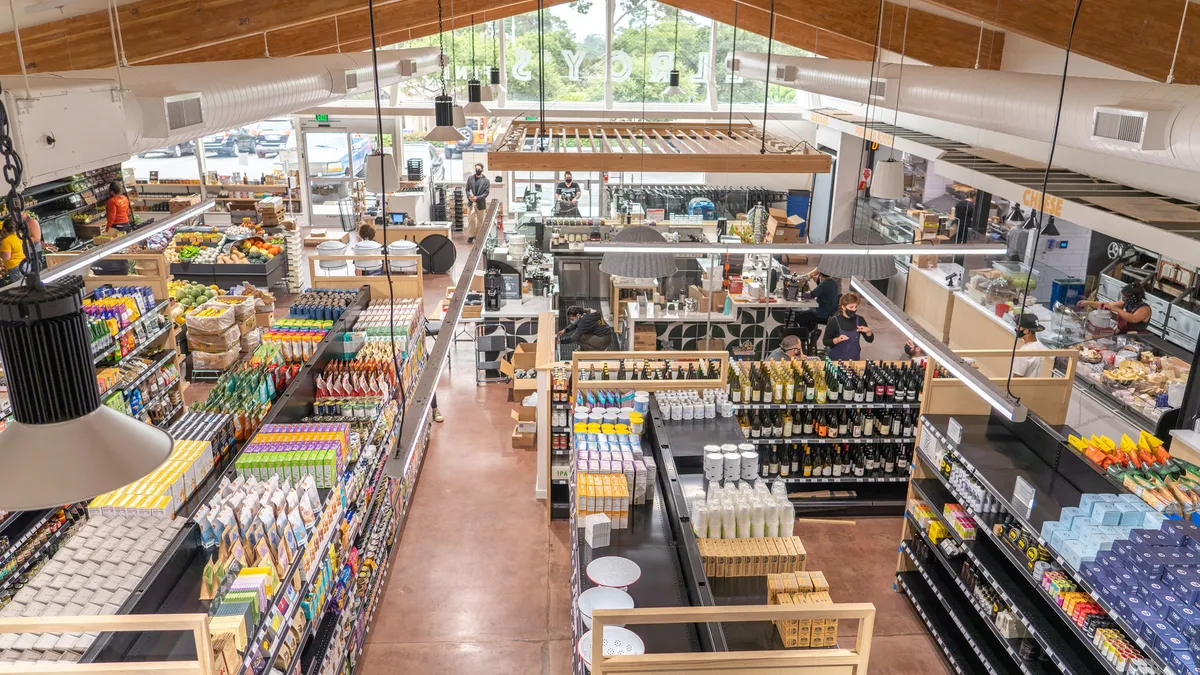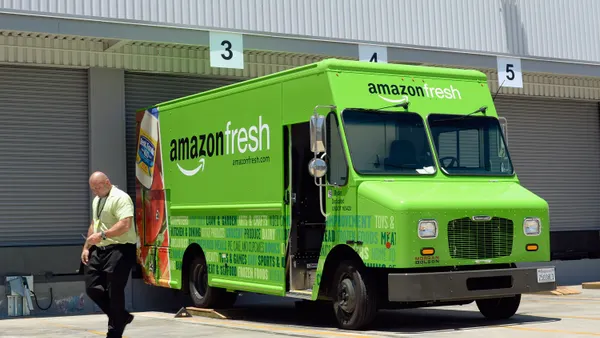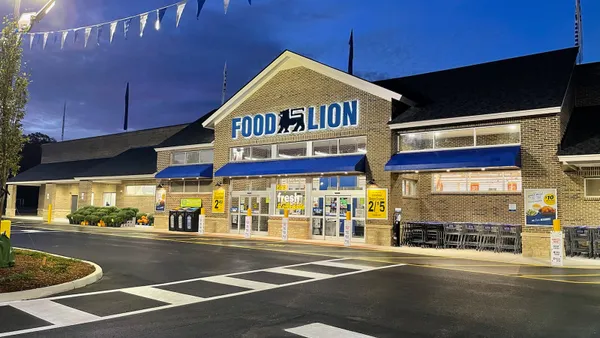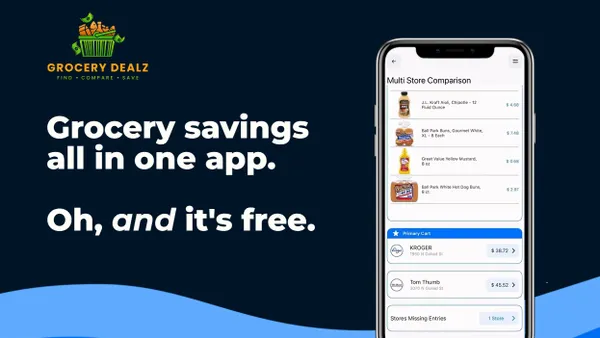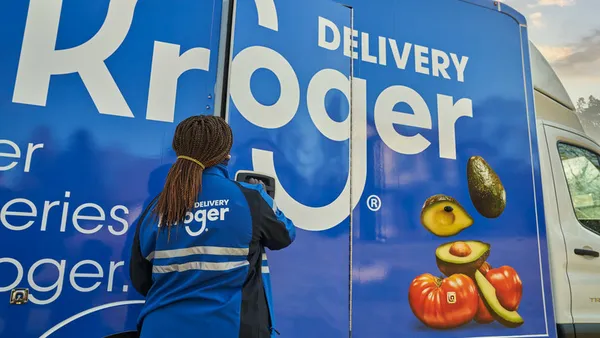Editor's note: This story is part of a series on the trends that will shape the grocery industry in 2021. You can find all the articles on our trendline.
Starting a new business can be hard enough, but grocery owners that opened shop last year faced the usual industry challenges coupled with the health and safety risks and supply chain headaches caused by the novel coronavirus pandemic.
Despite the pandemic-induced disruption, entrepreneurs around the U.S. still ventured into the grocery industry with its traditionally low margins to respond to the opportunities they saw in their local communities.
Grocery Dive spoke to owners of three independent grocery stores around the U.S. to find out what it was like opening during the chaos of 2020, how the pandemic has impacted their businesses and what they have their sights set on for 2021.
Elroy's Fine Foods in Monterey, California
Jay and Chloé Dolata always knew they wanted to open a grocery store after frequent trips to Papa Joe’s Gourmet Market in Michigan while dating. A little over a decade later, their dream came to fruition with the opening of Elroy's Fine Foods in Monterey, California, in August.
The couple started looking for a grocery store space after deciding in late 2007 to move to California and, in the meantime, owned a counter-serve cafe in nearby Carmel-by-the-Sea for 11 years. In 2019, they found the right spot: the storefront of a former supermarket two blocks away from a Whole Foods Market.
The Dolatas took inspiration from Erewhon Market, a luxury supermarket chain in the Los Angeles area. Chloé Dolata said Elroy’s urban feel appeals to the newcomers to the Monterey Peninsula who fled cities like San Francisco due to the pandemic. With its “wild yellow” paint and mid-century roofline, Elroy’s aims to appeal to value-oriented shoppers with its “overall feeling of fresh and beautiful and thoughtful,” she said.
The lower shelves make the store “feel open and friendly,” while the organic produce department is designed to “feel more like a farmers market,” she said. The organic bulk department boasts being just the second one in the U.S. to have entirely glass and stainless-steel bins. The store’s showpiece is an $85,000 stainless steel, wood-fired grill: “It’s just so much fun. People just stop and watch the food being cooked on it."
During the summer, Elroy’s had outdoor seating in a side alley with artificial turf, picnic tables and cafe lights. Chloé Dolata said she's looking forward to offering indoor seating at the bar, which offers beer, wine, coffee, lattes, smoothies, bowls and pastries.
The store places an emphasis on supplier diversity. “We love to support any sort of business that is either smaller or minority-owned or BIPOC-owned or female-owned or family-owned,” Chloé Dolata said. Working with a local farmer, they created a distribution system that allows for drop-offs at nearby farmers markets — consolidating deliveries while still getting produce the day it’s picked to the store.
Chloé Dolata said shoppers are putting pressure on major retailers to offer products from smaller and mission-driven companies. “We've seen the larger grocery chains adapt and become more organic and kind of follow those trends, because it's been demanded of them,” she said.
Customers also want e-commerce — an offering the Dolatas have faced some delays rolling out. Because the store’s e-commerce site is about 80% done and not yet live, Elroy’s provides FaceTime shopping appointments and delivery through a local bicycle delivery service or from the Dolatas themselves. “The [e-commerce] peak is now,” Chloé Dolata said. “It kills me that we're missing a lot of it, but you know, that's life.”
For 2021, top priorities at Elroy's include getting e-commerce ramped up and having the human resources department create a plan to help employees get vaccinated against COVID-19. Looking further ahead, the Dolatas plan to open two or three more stores within the next 10 years. As the business grows, she wants to implement open-book finance, and eventually, would like to offer profit-sharing.
Post-pandemic, the Dolatas envision offering free samples, hosting in-store events like apple tastings with local farmers and possibly even creating "Singles Night in the Produce Department" so people can get to know each other at their local gourmet market — just like Chloé and Jay Dolata did.
Black Market in Louisville, Kentucky
When a Kroger store in Louisville's West End neighborhood temporarily closed last June during protests over the police killing of David McAtee, a Black local barbecue restaurant owner, Shauntrice Martin knew she needed to help address food insecurity in the area.
Martin kicked off a community food justice initiative aimed at helping the local community “until the West End neighborhood had a Black-Owned and sustainable fresh food source for our residents,” the campaign page noted. The goal became reality when Martin held the soft opening for her grocery store on Black Friday, Nov. 27.
With Black Market, Martin is working to tackle several community needs at once: access to “real, healthy food,” support for Black-owned businesses and Black farmers and more job opportunities for locals. The store aims to have 90% of its products sourced from Black-owned businesses and Black farmers, she said.
Martin, who studied food apartheids across the globe and U.S., said her passion for tackling food insecurity stems from not having a grocery store within walking distance of the Louisville housing project she grew up in. “You had to take one or two buses to the closest Kroger, and then it was never really stocked well,” Martin said. “And I just remember growing up, my mother would rent a car just to go get groceries for everybody else in the neighborhood.”
In Louisville, roughly 120,100 people, including one in six children, face food insecurity, according to the Community Foundation of Louisville.
The store revamped a former Domino’s Pizza site that had been vacant for more than 10 years: “It's been a real eyesore in the community because people just dump their trash.” Now, the space is refreshed but only about a dozen shoppers are allowed inside a small area of the store due to safety protocols prompted by the pandemic. Because Black Market hasn’t been approved for the SNAP and WIC programs yet, Martin said it’s giving out groceries for free to people who ask if the store accepts EBT and WIC benefits.
Curbside pickup and deliveries are a big part of the business. Online shoppers can buy grocery bundles costing $30, $60 or $80 along with branded apparel. “It helps families to spend less time worrying about all sorts of things that you can order online, pick up or order online and have it delivered to you,” Martin said about the bundles.
Martin said her main priority for 2021 is to boost the pay and professional development opportunities for her workers: part-time fellows who “live in or are from the West End” that are guaranteed a job for one year. Currently, Black Market's five fellows work 25 hours per week for $10 per hour, although Martin would like to increase their pay to between $15 and $25 an hour by this time next year.
“They are all given the position of assistant manager with the choice to move on to manager whenever they feel ready,” Martin said. “We have courses that they're allowed to take for free, and if they do any of the training, that's paid.”
Martin, who works as an organizer for Kentuckians for the Commonwealth, an advocacy group, is forgoing a salary for the grocery store’s first year, and instead using it to help cover transportation and childcare costs and caregiver stipends for the contract workers. She’s also part of an effort to open a grocery co-op in Louisville and is continuing to run the food justice initiative, with the goal of feeding 200,000 people.
“The point is to get food out,” Martin said. “I don't know if it's going to make a profit … As long as we can pay people a living wage, as long as we can give out groceries to people who need it, I really don't care about if it makes money.”
Mason & Greens in Alexandria, Virginia
Justin and Anna Marino didn’t realize they would need to put their digital skills to work so quickly when their zero-waste grocery store debuted right as COVID-19 restrictions swept the U.S. last March.
Justin, who has a background in information technology and cybersecurity consulting, and Anna, who was a hairdresser for 10 years and ran her own Etsy shop, built a website that offers ship-to-home service along with store pickup and local delivery within 3 miles of the store.
“We didn't have our cleaning protocols in place and everything that we needed to make sure that it was safe for customers,” Justin Marino said. “We ended up launching the website a little bit sooner and that’s good because it kind of forced us down that road.”
The inspiration for Mason & Greens stemmed from their struggles with in-store and online grocery shopping to fit their vegan and plastic- and trash-free lifestyle. In 2019, they started planning their own store, snagging a prized rental spot along the main street in Alexandria just two blocks from where they live.
In late March, right around when Virginia’s governor announced a stay-at-home order, Mason & Greens opened as a dark store. The Marinos say it's the first zero-waste, sustainable dry goods and grocery store in the Washington, D.C., area.
In May, the store started offering appointment-only shopping, and by June, it was fully open to the public. The 1,200-square-foot store has three rooms: one with zero-waste products like shampoo, soaps, toys, housewares and bulk cleaners; a second with produce, grocery and bulk food products; and a third with baked goods and on-draft wine and beer for people who bring in their own containers.
Forgoing plastic has posed some challenges to zero-waste shopping during the pandemic, but the Marinos have found solutions. For the bakery items, which the Marinos wanted to be self-serve prior to the pandemic, store associates are picking them for customers instead of wrapping them in plastic for customers to grab, as many grocers have done.
The Marinos are offering paper bags to shoppers who don’t bring their own containers, and instead of sharing scoops for bulk items, each customer gets their own scoop. Workers are consistently sanitizing the store, the Marinos said.
"We hold cleanliness at a pretty high standard, and we needed to, whether we opened up during COVID or not, because, generally, [when] people think 'bulk shops,' they think 'dirty,'" Anna Marino said.
Many suppliers, especially the small ones, Mason & Greens works with have been receptive to the sustainability efforts and eliminating plastic use. “We do require [farmers and distributors] to also maintain the sort of ideals that we have, which is we don't want extra packaging. We don't want something plastic,” he noted. “That's hard in the food industry."
The Marinos have found that their store is “appealing to different crowds.” When it first opened, about 80% of the customers subscribed to a zero-waste lifestyle, while now, it’s more of an even split, Justin Marino estimated. More importantly, the shoppers are coming back: 60%-70% are repeat customers, he said.
In addition to local shoppers, Mason & Greens has customers from as far away as California and Massachusetts, the Marinos said. “We did actually plan on [e-commerce] being a good revenue stream for us because it allowed us to reach out a little bit to folks who are not in the immediate area,” Justin Marino said, noting that the zero-waste community is “pretty tightly knit.”
While the website traffic dropped last spring after a booming opening, the Marinos are confident e-commerce will grow their business. In addition to continuing to leverage their online presence, they want to establish more relationships with local farmers and, once safe, host store events and other opportunities to boost community engagement. Currently, they are looking for the right spot to open a store in D.C. before the end of the year.



